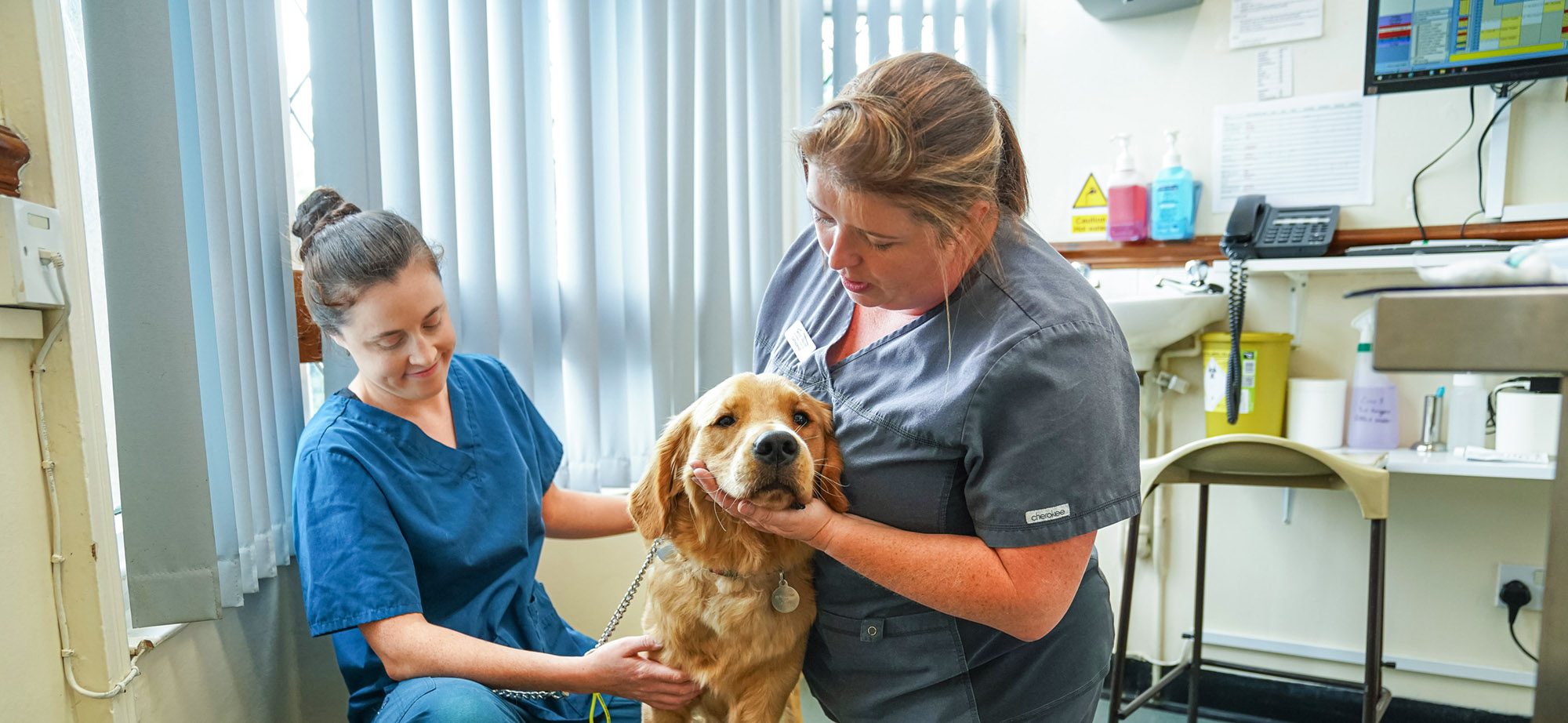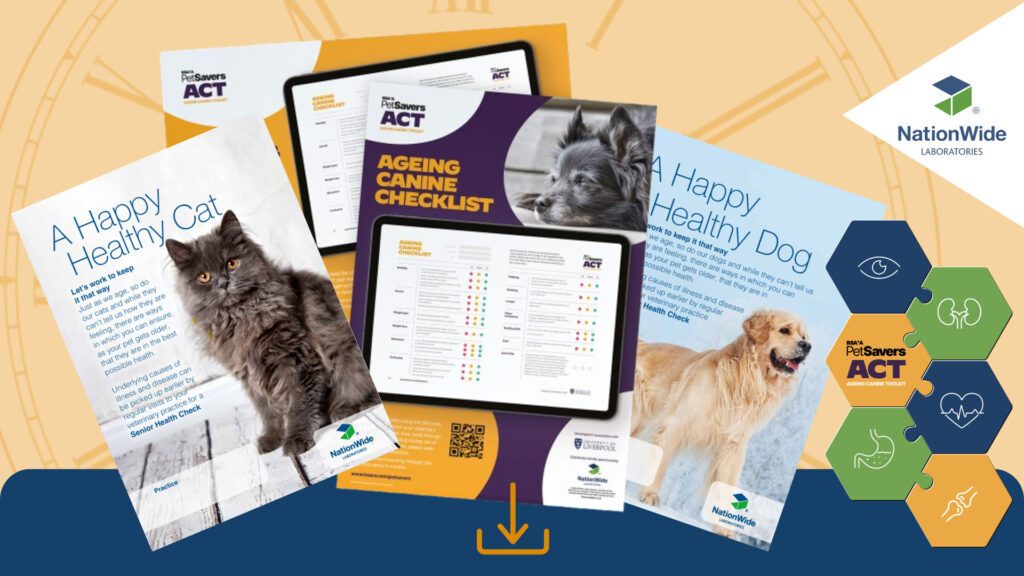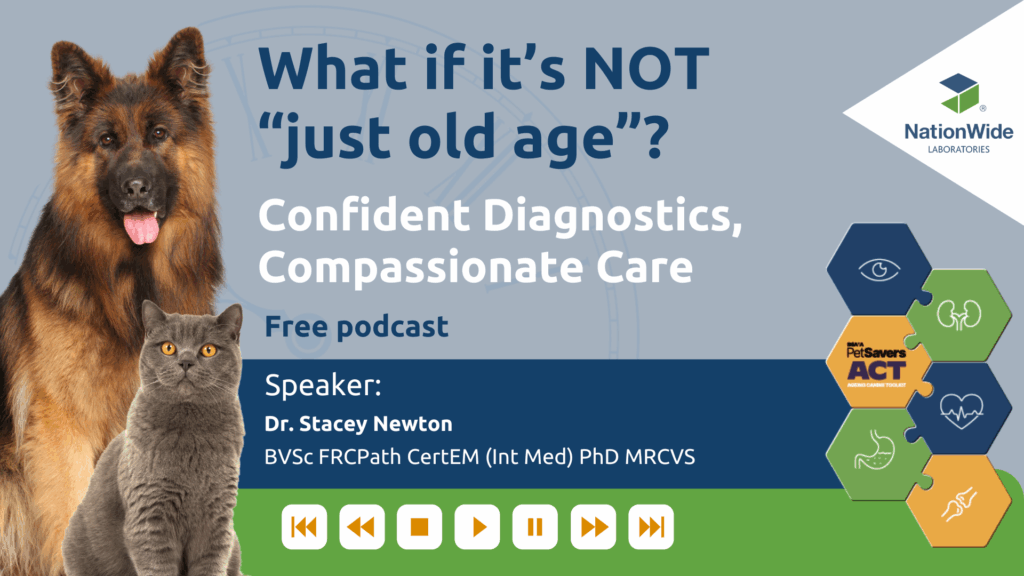
As pets live longer, veterinary teams are increasingly managing age-related conditions that impact quality of life. Ageing in dogs and cats is accompanied by physiological changes that may not be immediately visible but can significantly affect organ function, mobility, cognition, and overall wellbeing. Early detection and proactive management are essential.
At NationWide Laboratories, we support veterinary practices with a comprehensive portfolio of diagnostic tools tailored to senior pets. From canine wellness testing and feline wellness testing to advanced senior pet profiles and geriatric profiles, our services are designed to help you identify subtle changes before clinical signs emerge, enabling timely intervention and personalised care.
Ageing dogs often present with complex, overlapping conditions that require a structured diagnostic approach. Our Canine Senior Health Check Plus T4 and Canine Geriatric Profile are designed to support early detection and ongoing monitoring of age-related changes.
These profiles assess:
Routine canine wellness testing helps establish baselines and track trends over time, allowing you to intervene before clinical signs progress.
For breeds at higher risk of cancer, the Nu.Q® Vet Cancer Test offers a non-invasive screening tool that detects nucleosome changes in blood supporting earlier diagnosis and improved outcomes.
As part of a proactive approach to preventive care, Nu.Q® can be used on its own or alongside routine screening to aid early detection and informed decision-making.
Discussing options like Nu.Q® with owners opens up conversations about regular health assessments and long-term planning, helping them feel more confident in supporting their dog’s wellbeing, both today and as their dog grows older.
Alison Selby, Fundraising Manager for BSAVA PetSavers said: “We are thrilled to be embarking on this partnership with NationWide Laboratories. Working together in partnership, we hope to equip owners with the knowledge and confidence to support their dogs through the ageing process, ultimately improving their quality of life.”

Ageing Canine Toolkit (ACT)
At NationWide Laboratories we’re proud to partner with BSAVA PetSavers to support the Ageing Canine Toolkit (ACT), developed by the University of Liverpool. This evidence-based resource is designed to help veterinary professionals and pet owners identify early signs of age-related disease and guide meaningful conversations during consultations.
The Ageing Canine Toolkit (ACT) fits in well with our diagnostic offering, such as canine wellness testing, senior pet profiles, and canine geriatric profiles by helping veterinary teams connect clinical findings with the day-to-day realities of a dog’s behaviour, mobility, and overall wellbeing. It provides a practical framework to support early intervention, strengthen client communication, and enhance the continuity of care for ageing canine patients.
The Ageing Canine Toolkit (ACT) includes:
Cats are masters at masking illness, making proactive screening essential in senior care. Our Feline Senior Health Check and Feline Geriatric Profile Plus are designed to uncover early signs of disease through a comprehensive panel that includes:
Feline wellness testing is a cornerstone of preventative care, helping you detect subtle shifts in health status before they become clinically significant. With expert interpretation from our veterinary pathologists, you can confidently tailor treatment plans and improve outcomes for your ageing feline patients.
Cats age more uniformly due to their consistent phenotype and generally live longer than dogs. In contrast, dogs vary widely by breed and size, with large breeds ageing faster and having shorter lifespans than smaller breeds.
In dogs, ageing is associated with greying fur, reduced coat condition, sensory decline (such as hearing and vision loss), and behavioural changes like irritability or nervousness. Cats may show reduced grooming, altered sleep-wake cycles, vocalisation, and spatial or temporal disorientation. These changes may be subtle and easily overlooked.
Sarcopenia, the loss of skeletal muscle mass and function, is common and often occurs alongside obesity. Inflammageing, a decline in immune function linked to chronic inflammation, underpins many age-related conditions including osteoarthritis, renal failure, and heart disease. Cognitive decline, mobility issues, and oral health deterioration are also frequently seen.
Nutrients such as β-carotene, vitamin E, polyunsaturated fatty acids, B-vitamins, carnitine, and amino acids like arginine have been shown to support immune and cognitive function in ageing pets. However, current guidelines for senior pets need further refinement, and dietary plans should be tailored to individual needs.
While ageing involves biochemical changes, these are typically detectable only in later stages. Earlier identification of such changes could improve quality and longevity, but further research is needed to develop reliable screening biomarkers.
A detailed history, thorough physical examination, and use of diagnostic profiles tailored to geriatric patients are essential. Subtle clinical signs should prompt further investigation, as they may indicate underlying pathology.
Senior cats commonly suffer from chronic kidney disease (CKD), hyperthyroidism, hypertension, diabetes mellitus, cardiac disease, arthritis, neoplasia, cognitive dysfunction syndrome, and dental disease. These conditions may present with mild or non-specific symptoms.
Ageing cats show increased glomerular sclerosis, shortened telomeres, and reduced antioxidant defences. Early signs of CKD include increased thirst and urination, weight loss, reduced appetite, poor coat condition, halitosis, and mild dehydration. CKD may be present even when serum creatinine and SDMA are within normal ranges.
Behavioural changes such as disorientation, altered sleep patterns, excessive vocalisation, inappropriate toileting, reduced grooming, and changes in appetite or social interaction may indicate conditions like cognitive dysfunction, arthritis, CKD, or hyperthyroidism.
Creatinine typically rises only after 75% of renal function is lost, while SDMA increases after about 40% loss. Hyperthyroidism diagnosis relies on total T4 testing, which must be interpreted alongside clinical signs. In-house ELISA tests may overestimate T4 levels and should be used cautiously.
Routine bloodwork enables early detection of diseases such as CKD, hyperthyroidism, diabetes, liver disease, and anaemia. Establishing baseline values allows for more accurate interpretation of future results. Annual testing is recommended for senior cats, with biannual testing advised for geriatric or at-risk individuals.
Ageing dogs frequently develop dental disease, arthritis, chronic skin conditions, kidney and heart disease, endocrine disorders like Cushing’s and diabetes, and cancer. Monitoring relies on owner observations, clinical history, and regular diagnostics.
Breed and size influence disease patterns. Larger dogs are more prone to orthopaedic disease, cancer, and skin disorders, while smaller dogs more commonly develop cardiac and respiratory conditions. Kidney and urinary diseases increase with age but show no clear size association.
Signs such as increased thirst and urination, reduced appetite, lethargy, vomiting, and weight loss may indicate renal or hepatic dysfunction. A thorough history and comparison with baseline diagnostics are essential for accurate interpretation.
Regular screening, including bloodwork and urinalysis, supports early detection and management of age-related conditions. Annual testing is recommended for healthy seniors, with biannual testing for geriatric or symptomatic dogs.
Symptoms such as reluctance to move, reduced appetite, increased thirst, coughing, and disorientation may be misinterpreted as normal ageing but often reflect underlying disease.
The Nu.Q® Vet Cancer Test measures circulating nucleosome levels and can detect systemic cancers such as lymphoma and hemangiosarcoma. It is intended as a screening tool for clinically healthy dogs and should be followed by imaging and cytology for confirmation.
Senior pet panels should include CBC, biochemistry (including TP, albumin, globulin, glucose, urea, creatinine, ALT, ALP, electrolytes), T4, SDMA, NT-proBNP, and urinalysis. NationWide Laboratories offers Senior Health Check profiles for healthy pets and Geriatric Plus profiles for those with clinical signs. Testing is recommended every 6-12 months.
Reference intervals are based on young to middle-aged animals and may not apply to seniors. Muscle loss can lower creatinine, masking CKD. T4 may decrease with age without indicating hypothyroidism. Mild anaemia and reduced USG are common but may reflect early disease.
Most analyte changes outside reference intervals suggest disease. Only a few show purely age-related variation. Serial monitoring and clinical context are essential for accurate interpretation.
SDMA, NT-proBNP, albumin, cobalamin and folate are useful for detecting renal, cardiac, and gastrointestinal disease. Cytology is useful for any lumps or masses. These markers support early intervention and tailored care.
Baseline values allow meaningful interpretation of trends. A 30% increase in creatinine between tests may indicate reduced GFR, even if values remain within reference limits. Serial results should be tracked and compared using consistent assay methods.
Lab tests are only one part of the diagnostic process. Owner observations and regular wellness exams are essential for early detection and comprehensive care.
Veterinary nurses, technicians, and receptionists play a vital role in recognising age-related changes and educating owners. Training in geriatric care, awareness of subtle clinical signs, and use of checklists or toolkits, such as the BSAVA PetSavers Ageing Canine Toolkit, can enhance support. Clear communication, tailored advice, and regular follow-up help ensure ageing pets receive the care they need.
You can find more information about ageing pet diagnostics and care from a range of trusted veterinary sources and peer-reviewed publications. The 2019 AAHA Canine Life Stage Guidelines and the 2021 AAHA/AAFP Feline Life Stage Guidelines offer definitions and care recommendations for senior pets. The 2021 AAFP Feline Senior Care Guidelines and publications by Dhaliwal et al. and Ray et al. provide clinical protocols and nutritional advice. For disease-specific insights, refer to Guelfi et al. on dog ageing, Bermingham et al. on nutrition, and Brown et al. on feline CKD. Diagnostic performance is covered in Brans et al. and eClinPath’s SDMA overview. Additional resources include the IRIS CKD Guidelines, Cornell University’s feline health topics, the BSAVA PetSavers Ageing Canine Toolkit, and NationWide Laboratories own Nu.Q® Vet Cancer Test page.

Speakers: Alina Bodnariu, DVM MSc PhD FRCPath MRCVS, Helen Campbell BVM&S FRCPath MRCVS
This session explores species-specific differences in laboratory results, breed-related nuances, and age-related shifts in reference intervals, essential knowledge for interpreting senior pet diagnostics.

Guest: Stacey Newton BVSc FRCPath CertEM (Int Med) PhD MRCVS, Head of Clinical Pathology at NationWide Laboratories
Stacey discusses how subtle changes in senior pets, like shifts in weight, activity, or coat condition, can signal underlying health issues. She highlights the BSAVA PetSavers ACT as a valuable tool to support earlier conversations and better-informed care decisions.
Blog Articles
Canine Case Studies
Feline Case Studies
Our blog features a growing library of articles and case studies designed for bite-size learning, check it out.
NationWide Laboratories offers the tools and resources to help you deliver confident, proactive care for ageing pets. Explore our diagnostic profiles, download client-friendly materials, and stay informed with practical content designed for everyday practice.
Have questions or want to discuss how we can support your team? Contact us.
Looking for the right test or profile? Explore our test directory.